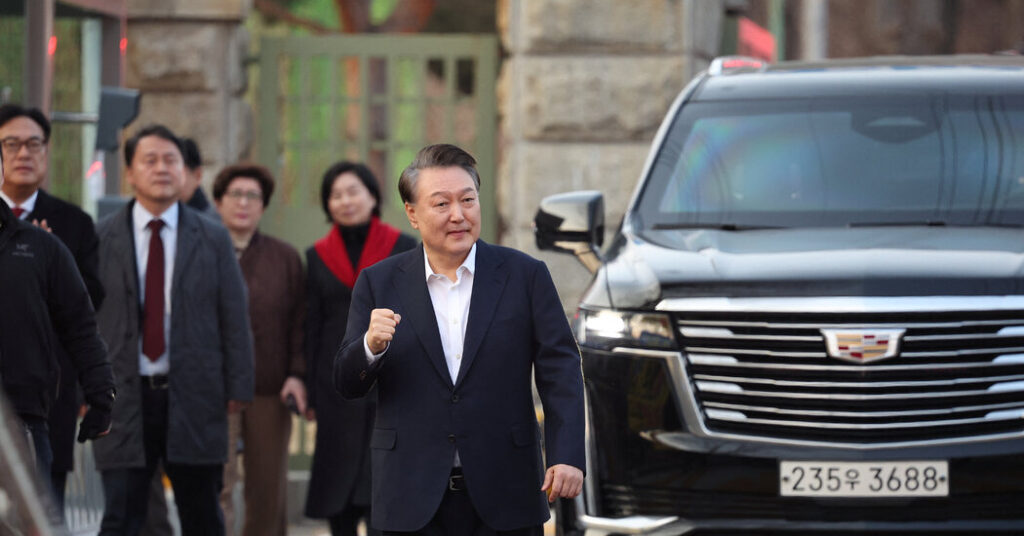Imagine the scene: a former president, embroiled in a political storm, walking out of a detention center with a broad smile and a wave to his supporters. This is precisely what happened in South Korea when Yoon Suk Yeol, the country’s impeached president, was released from jail. The release came a day after a court ruled that his detention was invalid, marking a dramatic turn in his ongoing legal battles.
The Court’s Decision
The Seoul Central District Court made headlines on Friday when it ruled that prosecutors had violated procedural rules. Specifically, they held Mr. Yoon in detention longer than legally allowed before indicting him in January. This procedural violation was the key factor in the court’s decision to declare Mr. Yoon’s detention invalid.
Prosecutors’ Response
Prosecutors had a week to appeal the court’s decision. However, instead of appealing, they requested Mr. Yoon’s release. This move surprised many, as it allowed the former president to walk free while still facing serious charges.
Yoon Suk Yeol’s Release
On Saturday, Mr. Yoon walked out of a detention center south of Seoul, where he had been held since January 15. As he left the facility, he couldn’t hide his joy. He smiled broadly and waved at his supporters, who had gathered to witness this moment.
Impact on Ongoing Trials
While Mr. Yoon’s release is a significant development, it does not affect the charges he faces. He is still standing trial in a Seoul criminal court on insurrection charges related to his decision to impose martial law in December. Additionally, separate proceedings are ongoing at the Constitutional Court.
The Constitutional Court is currently deliberating whether Mr. Yoon’s parliamentary impeachment was legitimate. If the court rules against him, he could be formally removed from office. However, his release means he will be free while these legal battles continue.
The Political Context
Yoon Suk Yeol’s case is not just a legal matter; it’s deeply entwined with South Korea’s political landscape. His decision to impose martial law sparked widespread protests and led to his impeachment by parliament. The public’s reaction to his release will likely influence the political climate in the country.
Public Reaction
The release of an impeached president is bound to stir emotions. Supporters of Mr. Yoon see his release as a victory, while critics argue that he should remain in custody given the severity of the charges against him.
Political analysts suggest that the public’s response could impact upcoming elections and the overall political stability of South Korea. The country is no stranger to political turmoil, and this latest development adds another layer to its complex political narrative.
What’s Next for Yoon Suk Yeol?
With his release from detention, Mr. Yoon now faces the challenge of navigating his legal battles outside of jail. His trial on insurrection charges will continue, and the outcome could have far-reaching consequences for his political future.
Legal Strategy
Mr. Yoon’s legal team will need to develop a robust strategy to defend against the insurrection charges. They will also need to prepare for the Constitutional Court’s decision on his impeachment. The stakes are high, and every move will be closely watched by the public and political analysts alike.
Political Implications
Beyond the courtroom, Mr. Yoon’s release could have significant political implications. If he is acquitted or the Constitutional Court rules in his favor, he might attempt a political comeback. However, if he is found guilty, his political career could be over.
The next few months will be crucial for Mr. Yoon. He will need to balance his legal defense with maintaining public support, all while navigating the complex political landscape of South Korea.
The Broader Implications
Yoon Suk Yeol’s release is not just a personal victory; it has broader implications for South Korea’s political system. It raises questions about the rule of law, the power of the judiciary, and the balance of power between different branches of government.
Rule of Law
The court’s decision to release Mr. Yoon due to procedural violations highlights the importance of the rule of law. It shows that even high-profile figures like a former president must adhere to legal procedures. This ruling could set a precedent for future cases involving political figures.
Judicial Independence
The independence of the judiciary is another key issue. The Seoul Central District Court’s decision to rule against the prosecutors demonstrates the judiciary’s willingness to act independently, even in politically charged cases. This independence is crucial for maintaining public trust in the legal system.
Balance of Power
Finally, Mr. Yoon’s case raises questions about the balance of power in South Korea. The ongoing proceedings at the Constitutional Court and the criminal trial in Seoul highlight the different roles of various branches of government. How these branches interact and influence each other will be closely watched by political observers.
Looking Ahead
As South Korea moves forward, the case of Yoon Suk Yeol will continue to be a focal point of national attention. The outcome of his trials and the Constitutional Court’s decision will have significant implications for the country’s political future.
Meanwhile, Mr. Yoon will need to navigate his legal challenges while maintaining his public image. His release from detention marks a new chapter in his political saga, one that will be closely watched by supporters and critics alike.
In the end, the story of Yoon Suk Yeol is more than just a tale of one man’s legal troubles. It is a reflection of the broader political dynamics at play in South Korea, a country that continues to grapple with the challenges of democracy and governance. As the legal proceedings unfold, the world will be watching to see how this story concludes.
Source: www.nytimes.com
